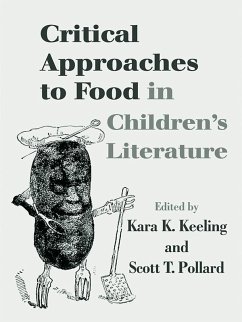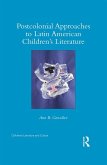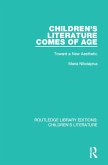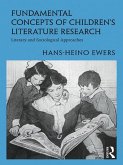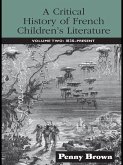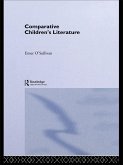Critical Approaches to Food in Children's Literature (eBook, PDF)
Redaktion: Keeling, Kara K.; Pollard, Scott T.
48,95 €
48,95 €
inkl. MwSt.
Sofort per Download lieferbar

24 °P sammeln
48,95 €
Als Download kaufen

48,95 €
inkl. MwSt.
Sofort per Download lieferbar

24 °P sammeln
Jetzt verschenken
Alle Infos zum eBook verschenken
48,95 €
inkl. MwSt.
Sofort per Download lieferbar
Alle Infos zum eBook verschenken

24 °P sammeln
Critical Approaches to Food in Children's Literature (eBook, PDF)
Redaktion: Keeling, Kara K.; Pollard, Scott T.
- Format: PDF
- Merkliste
- Auf die Merkliste
- Bewerten Bewerten
- Teilen
- Produkt teilen
- Produkterinnerung
- Produkterinnerung

Bitte loggen Sie sich zunächst in Ihr Kundenkonto ein oder registrieren Sie sich bei
bücher.de, um das eBook-Abo tolino select nutzen zu können.
Hier können Sie sich einloggen
Hier können Sie sich einloggen
Sie sind bereits eingeloggt. Klicken Sie auf 2. tolino select Abo, um fortzufahren.

Bitte loggen Sie sich zunächst in Ihr Kundenkonto ein oder registrieren Sie sich bei bücher.de, um das eBook-Abo tolino select nutzen zu können.
This book is the first scholarly volume to connect children's literature to the burgeoning discipline of food studies. Spanning genres and regions, the essays utilize a variety of approaches, including archival research, cultural studies, formalism, gender studies, post-colonialism, post-structuralism, race studies, structuralism, and theology.
- Geräte: PC
- mit Kopierschutz
- eBook Hilfe
- Größe: 5.28MB
Andere Kunden interessierten sich auch für
![Postcolonial Approaches to Latin American Children's Literature (eBook, PDF) Postcolonial Approaches to Latin American Children's Literature (eBook, PDF)]() Ann GonzálezPostcolonial Approaches to Latin American Children's Literature (eBook, PDF)44,95 €
Ann GonzálezPostcolonial Approaches to Latin American Children's Literature (eBook, PDF)44,95 €![Critical Approaches to Sjón (eBook, PDF) Critical Approaches to Sjón (eBook, PDF)]() Critical Approaches to Sjón (eBook, PDF)41,95 €
Critical Approaches to Sjón (eBook, PDF)41,95 €![Children's Literature Comes of Age (eBook, PDF) Children's Literature Comes of Age (eBook, PDF)]() Maria NikolajevaChildren's Literature Comes of Age (eBook, PDF)34,95 €
Maria NikolajevaChildren's Literature Comes of Age (eBook, PDF)34,95 €![Fundamental Concepts of Children's Literature Research (eBook, PDF) Fundamental Concepts of Children's Literature Research (eBook, PDF)]() Hans-Heino EwersFundamental Concepts of Children's Literature Research (eBook, PDF)56,95 €
Hans-Heino EwersFundamental Concepts of Children's Literature Research (eBook, PDF)56,95 €![A Critical History of French Children's Literature (eBook, PDF) A Critical History of French Children's Literature (eBook, PDF)]() Penelope E. BrownA Critical History of French Children's Literature (eBook, PDF)48,95 €
Penelope E. BrownA Critical History of French Children's Literature (eBook, PDF)48,95 €![Lying, Truthtelling, and Storytelling in Children's and Young Adult Literature (eBook, PDF) Lying, Truthtelling, and Storytelling in Children's and Young Adult Literature (eBook, PDF)]() Anita TarrLying, Truthtelling, and Storytelling in Children's and Young Adult Literature (eBook, PDF)41,95 €
Anita TarrLying, Truthtelling, and Storytelling in Children's and Young Adult Literature (eBook, PDF)41,95 €![Comparative Children's Literature (eBook, PDF) Comparative Children's Literature (eBook, PDF)]() Emer O'SullivanComparative Children's Literature (eBook, PDF)56,95 €
Emer O'SullivanComparative Children's Literature (eBook, PDF)56,95 €-
-
-
This book is the first scholarly volume to connect children's literature to the burgeoning discipline of food studies. Spanning genres and regions, the essays utilize a variety of approaches, including archival research, cultural studies, formalism, gender studies, post-colonialism, post-structuralism, race studies, structuralism, and theology.
Dieser Download kann aus rechtlichen Gründen nur mit Rechnungsadresse in A, B, BG, CY, CZ, D, DK, EW, E, FIN, F, GR, HR, H, IRL, I, LT, L, LR, M, NL, PL, P, R, S, SLO, SK ausgeliefert werden.
Produktdetails
- Produktdetails
- Verlag: Taylor & Francis
- Seitenzahl: 290
- Erscheinungstermin: 20. März 2012
- Englisch
- ISBN-13: 9781135893019
- Artikelnr.: 42983853
- Verlag: Taylor & Francis
- Seitenzahl: 290
- Erscheinungstermin: 20. März 2012
- Englisch
- ISBN-13: 9781135893019
- Artikelnr.: 42983853
- Herstellerkennzeichnung Die Herstellerinformationen sind derzeit nicht verfügbar.
Kara K. Keeling and Scott T. Pollard have published articles on food and children's literature in Children's Literature in Education and Beatrix Potter's Peter Rabbit: A Children's Classic at 100. They are working on their own book-length study of the topic. Both teach in the English Department at Christopher Newport University, Keeling specializing in children's and young adult literature, and Pollard in world literature and critical theory.
Series Editor's Foreword
Acknowledgments
Part I. Introduction
1. Introduction
Kara K. Keeling and Scott T. Pollard
Part II. Reading as Cooking
2. Delicious Supplements: Literary Cookbooks as Additives to Children's
Texts
Jodie Slothower and Jan Susina
Part III. Girls, Mothers, Children
3. Recipe for Reciprocity and Repression: The Politics of Cooking and
Consumption in Girls' Coming-of-Age Literature
Holly Blackford
4. The Apple of her Eye: The Mothering Ideology Fed by Bestselling Trade
Picture Books
Lisa Rowe Fraustino
Part IV. Food and the Body
5. Nancy Drew and the "F" Word
Leona W. Fisher
6. To Eat and Be Eaten in Nineteenth-century Children's Literature
Jacqueline M. Labbe
7. Voracious Appetites: The Construction of "Fatness" in the Boy Hero in
English Children's Literature
Jean Webb
Part V. Global/Multicultural/Post-colonial Food
8. "The Eaters of Everything": Etiquettes of Empire in Kipling's Narratives
of Imperial Boys
Winnie Chan
9. Eating Different, Looking Different: Food in the Asian-American
Childhood
Lan Dong
10. The Potato Eaters: Food Collection in Irish Famine Literature for
Children
Karen Hill McNamara
11. The Keys to the Kitchen: Cooking and Latina Power in Latin(o) American
Children's Stories
Genny Ballard
12. Sugar or Spice? The Flavor of Gender Self-Identity in an Example of
Brazilian Children's Literature
Richard Vernon
Part VI. Through Food the/a Self
13. Oranges of Paradise: The Orange as Symbol of Escape and Loss in
Children's Literature
James Everett
14. Trials of Taste: Ideological "Food Fights" in Madeleine L'Engle's A
Wrinkle in Time
Elizabeth Gargano
15. A Consuming Tradition: Candy and Socio-religious Identity Formation in
Roald Dahl's Charlie and the Chocolate Factory
Robert M. Kachur
16. Prevailing Culinary, Psychological, and Metaphysical Conditions:
Meatballs and Reality
Martha Satz
17. "The Attack of the Inedible Hunk!": Food, Language, and Power in the
Captain Underpants Series
Annette Wannamaker
Contributors
Index
Acknowledgments
Part I. Introduction
1. Introduction
Kara K. Keeling and Scott T. Pollard
Part II. Reading as Cooking
2. Delicious Supplements: Literary Cookbooks as Additives to Children's
Texts
Jodie Slothower and Jan Susina
Part III. Girls, Mothers, Children
3. Recipe for Reciprocity and Repression: The Politics of Cooking and
Consumption in Girls' Coming-of-Age Literature
Holly Blackford
4. The Apple of her Eye: The Mothering Ideology Fed by Bestselling Trade
Picture Books
Lisa Rowe Fraustino
Part IV. Food and the Body
5. Nancy Drew and the "F" Word
Leona W. Fisher
6. To Eat and Be Eaten in Nineteenth-century Children's Literature
Jacqueline M. Labbe
7. Voracious Appetites: The Construction of "Fatness" in the Boy Hero in
English Children's Literature
Jean Webb
Part V. Global/Multicultural/Post-colonial Food
8. "The Eaters of Everything": Etiquettes of Empire in Kipling's Narratives
of Imperial Boys
Winnie Chan
9. Eating Different, Looking Different: Food in the Asian-American
Childhood
Lan Dong
10. The Potato Eaters: Food Collection in Irish Famine Literature for
Children
Karen Hill McNamara
11. The Keys to the Kitchen: Cooking and Latina Power in Latin(o) American
Children's Stories
Genny Ballard
12. Sugar or Spice? The Flavor of Gender Self-Identity in an Example of
Brazilian Children's Literature
Richard Vernon
Part VI. Through Food the/a Self
13. Oranges of Paradise: The Orange as Symbol of Escape and Loss in
Children's Literature
James Everett
14. Trials of Taste: Ideological "Food Fights" in Madeleine L'Engle's A
Wrinkle in Time
Elizabeth Gargano
15. A Consuming Tradition: Candy and Socio-religious Identity Formation in
Roald Dahl's Charlie and the Chocolate Factory
Robert M. Kachur
16. Prevailing Culinary, Psychological, and Metaphysical Conditions:
Meatballs and Reality
Martha Satz
17. "The Attack of the Inedible Hunk!": Food, Language, and Power in the
Captain Underpants Series
Annette Wannamaker
Contributors
Index
Series Editor's Foreword
Acknowledgments
Part I. Introduction
1. Introduction
Kara K. Keeling and Scott T. Pollard
Part II. Reading as Cooking
2. Delicious Supplements: Literary Cookbooks as Additives to Children's
Texts
Jodie Slothower and Jan Susina
Part III. Girls, Mothers, Children
3. Recipe for Reciprocity and Repression: The Politics of Cooking and
Consumption in Girls' Coming-of-Age Literature
Holly Blackford
4. The Apple of her Eye: The Mothering Ideology Fed by Bestselling Trade
Picture Books
Lisa Rowe Fraustino
Part IV. Food and the Body
5. Nancy Drew and the "F" Word
Leona W. Fisher
6. To Eat and Be Eaten in Nineteenth-century Children's Literature
Jacqueline M. Labbe
7. Voracious Appetites: The Construction of "Fatness" in the Boy Hero in
English Children's Literature
Jean Webb
Part V. Global/Multicultural/Post-colonial Food
8. "The Eaters of Everything": Etiquettes of Empire in Kipling's Narratives
of Imperial Boys
Winnie Chan
9. Eating Different, Looking Different: Food in the Asian-American
Childhood
Lan Dong
10. The Potato Eaters: Food Collection in Irish Famine Literature for
Children
Karen Hill McNamara
11. The Keys to the Kitchen: Cooking and Latina Power in Latin(o) American
Children's Stories
Genny Ballard
12. Sugar or Spice? The Flavor of Gender Self-Identity in an Example of
Brazilian Children's Literature
Richard Vernon
Part VI. Through Food the/a Self
13. Oranges of Paradise: The Orange as Symbol of Escape and Loss in
Children's Literature
James Everett
14. Trials of Taste: Ideological "Food Fights" in Madeleine L'Engle's A
Wrinkle in Time
Elizabeth Gargano
15. A Consuming Tradition: Candy and Socio-religious Identity Formation in
Roald Dahl's Charlie and the Chocolate Factory
Robert M. Kachur
16. Prevailing Culinary, Psychological, and Metaphysical Conditions:
Meatballs and Reality
Martha Satz
17. "The Attack of the Inedible Hunk!": Food, Language, and Power in the
Captain Underpants Series
Annette Wannamaker
Contributors
Index
Acknowledgments
Part I. Introduction
1. Introduction
Kara K. Keeling and Scott T. Pollard
Part II. Reading as Cooking
2. Delicious Supplements: Literary Cookbooks as Additives to Children's
Texts
Jodie Slothower and Jan Susina
Part III. Girls, Mothers, Children
3. Recipe for Reciprocity and Repression: The Politics of Cooking and
Consumption in Girls' Coming-of-Age Literature
Holly Blackford
4. The Apple of her Eye: The Mothering Ideology Fed by Bestselling Trade
Picture Books
Lisa Rowe Fraustino
Part IV. Food and the Body
5. Nancy Drew and the "F" Word
Leona W. Fisher
6. To Eat and Be Eaten in Nineteenth-century Children's Literature
Jacqueline M. Labbe
7. Voracious Appetites: The Construction of "Fatness" in the Boy Hero in
English Children's Literature
Jean Webb
Part V. Global/Multicultural/Post-colonial Food
8. "The Eaters of Everything": Etiquettes of Empire in Kipling's Narratives
of Imperial Boys
Winnie Chan
9. Eating Different, Looking Different: Food in the Asian-American
Childhood
Lan Dong
10. The Potato Eaters: Food Collection in Irish Famine Literature for
Children
Karen Hill McNamara
11. The Keys to the Kitchen: Cooking and Latina Power in Latin(o) American
Children's Stories
Genny Ballard
12. Sugar or Spice? The Flavor of Gender Self-Identity in an Example of
Brazilian Children's Literature
Richard Vernon
Part VI. Through Food the/a Self
13. Oranges of Paradise: The Orange as Symbol of Escape and Loss in
Children's Literature
James Everett
14. Trials of Taste: Ideological "Food Fights" in Madeleine L'Engle's A
Wrinkle in Time
Elizabeth Gargano
15. A Consuming Tradition: Candy and Socio-religious Identity Formation in
Roald Dahl's Charlie and the Chocolate Factory
Robert M. Kachur
16. Prevailing Culinary, Psychological, and Metaphysical Conditions:
Meatballs and Reality
Martha Satz
17. "The Attack of the Inedible Hunk!": Food, Language, and Power in the
Captain Underpants Series
Annette Wannamaker
Contributors
Index
